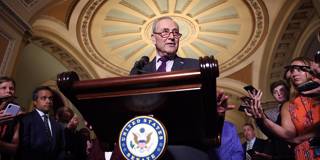With the US Innovation and Competition Act of 2021, America is fully embracing industrial policy as the all-encompassing solution to a wide range of economic, social, and strategic problems. But all of the objectives articulated in the bill could be achieved more effectively by other means.
WASHINGTON, DC – When a government sets out to “pick winners” and support designated industries, products, or firms through subsidies, tariff protections, tax breaks, and other measures, it is pursuing an industrial policy. For advocates of this approach, the idea is that the state should step in to boost “particular industries that are considered strategically important” when it is expected that markets and the private sector will not do so on their own.
Despite its long history of failures, industrial policy is back on the agenda in the United States. In early June, the US Senate passed the US Innovation and Competition Act (USICA) of 2021, which envisions a more active role for government in the economy. According to Senate Majority Leader Chuck Schumer, the legislation will “jumpstart American competitiveness and make one of the most significant government investments in American innovation and manufacturing in generations.” The bill will now go to the House of Representatives, where it is expected to pass.
Most people agree that the government has an important and appropriate role to play in providing infrastructure, education, health care, social services, and other public goods such as basic research. But the USICA is full of provisions that are geared toward other objectives.

WASHINGTON, DC – When a government sets out to “pick winners” and support designated industries, products, or firms through subsidies, tariff protections, tax breaks, and other measures, it is pursuing an industrial policy. For advocates of this approach, the idea is that the state should step in to boost “particular industries that are considered strategically important” when it is expected that markets and the private sector will not do so on their own.
Despite its long history of failures, industrial policy is back on the agenda in the United States. In early June, the US Senate passed the US Innovation and Competition Act (USICA) of 2021, which envisions a more active role for government in the economy. According to Senate Majority Leader Chuck Schumer, the legislation will “jumpstart American competitiveness and make one of the most significant government investments in American innovation and manufacturing in generations.” The bill will now go to the House of Representatives, where it is expected to pass.
Most people agree that the government has an important and appropriate role to play in providing infrastructure, education, health care, social services, and other public goods such as basic research. But the USICA is full of provisions that are geared toward other objectives.